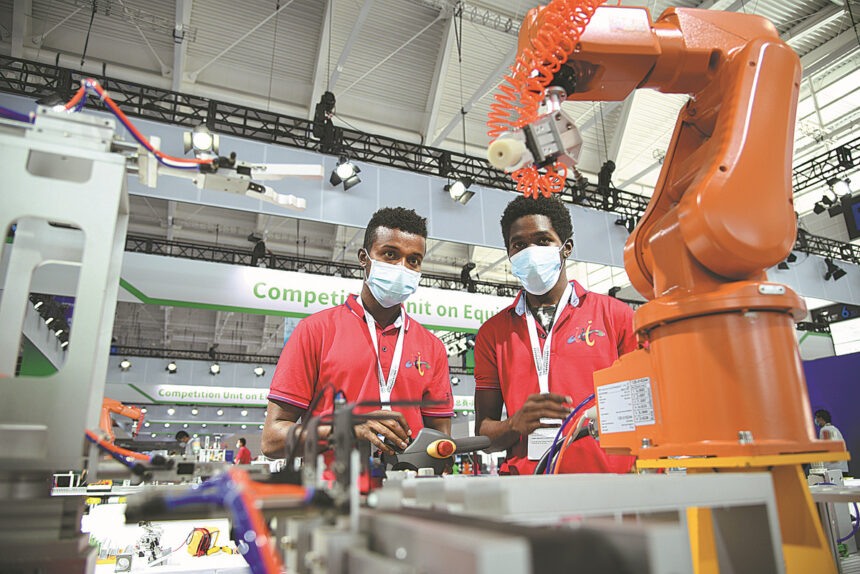China is employing vocational training as a strategic instrument to enhance connections with nations in the Global South. This initiative was launched in Thailand in 2016 and has subsequently expanded worldwide under the oversight of China’s Ministry of Education. The objective of the project is to transfer Chinese vocational education standards, models, and equipment to partner countries, with a specific focus on imparting practical skills in areas such as electromechanical and renewable energy,
An exemplary instance is the Ethiopian Luban Workshop, which has been officially recognized by the African Union as a premier centre for imparting high-caliber skills training to the entire continent. Throughout this workshop, up to 200 students hailing from several African countries have received training, equipping them with the necessary skills for employment in technology firms. Equivalent facilities have been set up in Egypt, where students are provided with practical instruction in renewable energy technologies, hence enhancing the incorporation of Chinese technological knowledge into the local economies.
In contrast to the contentious Confucius Institutes, which primarily concentrate on Chinese language and culture and have been accused of serving as propaganda instruments, the Luban workshops are comparatively less politically sensitive and prioritize the development of practical skills that enhance employability. China views this vocational education project as a means to cultivate a favourable foreign reputation, bolster its globally functioning businesses, and counteract Western influence. China is cultivating indigenous talent with a deep understanding of the Chinese language and culture, to establish enduring alliances that are in line with its wider diplomatic and economic objectives.
Read more below.
Why China is looking to vocational training to build bridges with the Global South
It has since been deemed a national project under the supervision of the Education Ministry, which says it brings the “standards, models, equipment and programmes of Chinese vocational education” to participating countries.
In a sign of the grand ambitions behind the project, China’s main foreign aid agency recently said the Ethiopian Luban Workshop based in Addis Ababa, “has been designated as a high-quality skills training centre for the entire African continent by the African Union headquarters”.
“To date, the workshop has successfully conducted five training programmes, benefiting nearly 200 vocational education talents from Ethiopia, Kenya, Tanzania, and other countries,” the China International Development Cooperation Agency wrote in a recent Facebook post.
Wallelgn Yonas Akele, one of the teachers at the institute, said: “What we teach at the workshop is very practical and the students here can achieve all-round development both intellectually and in practical skills.”
According to Wallelgn, who has a master’s degree from the Tianjin University of Technology and Education, more than 300 students aged between 20 and 28 are enrolled in various vocational programmes at the workshop in Addis Ababa.
“After graduation, [I am confident] that they can easily find work at technology companies in Ethiopia,” he said.
Mennatallah Ayman Gomaa, an undergraduate at Mansoura University in Egypt, said she had spent an “incredibly valuable” two weeks at the Luban Egypt Centre for Vocational Training in Cairo learning how to operate solar energy kits and wind turbines.
She said the facility based at the faculty of engineering at Ain Shams University had helped her to gain hands-on experience of operating renewable energy systems, which proved essential in her future university studies.
“Equipment there was funded by China, and teachers were told how to use that equipment by Chinese technical guides who funded the workshop,” Gomaa said.

The centre was co-founded by Tianjin Light Industry Vocational Technical College, Tianjin Transportation Technical College and Ain Shams University in late 2020 to provide training in areas ranging from computer numerical control – a technology used for making precision machine tools – to new energy and car maintenance.
A second Luban workshop has since opened in Cairo at the Advanced Technical School for Maintenance Technology, prompting Mohamed Megahed, Egypt’s minister responsible for technical education, to tell Chinese state news agency Xinhua he was “proud” the country had two of the training centres.
Unlike Confucius Institutes, which offer Chinese-language education but have faced intense scrutiny in Western countries for allegedly serving as propaganda tools, the Luban workshops have faced much less challenge.
Peng Binbai, director for vocational education at the Ministry of Education, said last month that more than 200 vocational institutions from China were operating in more than 70 countries and regions.
“Vocational education has inherent advantages in promoting foreign exchanges and cooperation – focusing on skills, reducing sensitivities and promoting employment,” Peng wrote in an article published in the state-run Journal of International Education said.
“It is a vital force enabling us to break through the suppression by the US and the West, serving the strategy of strengthening the country through education, the overall execution of our diplomatic agenda and supporting Chinese enterprises to go abroad.”
Zhao Zhiqun, a specialist in vocational education at Beijing Normal University, said the workshops could “have a positive effect on achieving social equality and economic prosperity in the host countries, as well as on building a positive and responsible image of China as a great power in diplomacy”.

He said there was also an “ideological dimension” to education, especially at the academic level. “International cooperation in [non-vocational] education is deeply influenced by ideological factors, which makes it difficult to carry out in today’s complex international environment,” Zhao said.
He argued that vocational education was “most closely integrated with economic development”.
“In the future, the focus of China’s vocational education should be about serving Chinese enterprises going abroad, by cultivating local vocational talent teams that understand Chinese language and culture,” Zhao said.
Source: South China Morning Post







